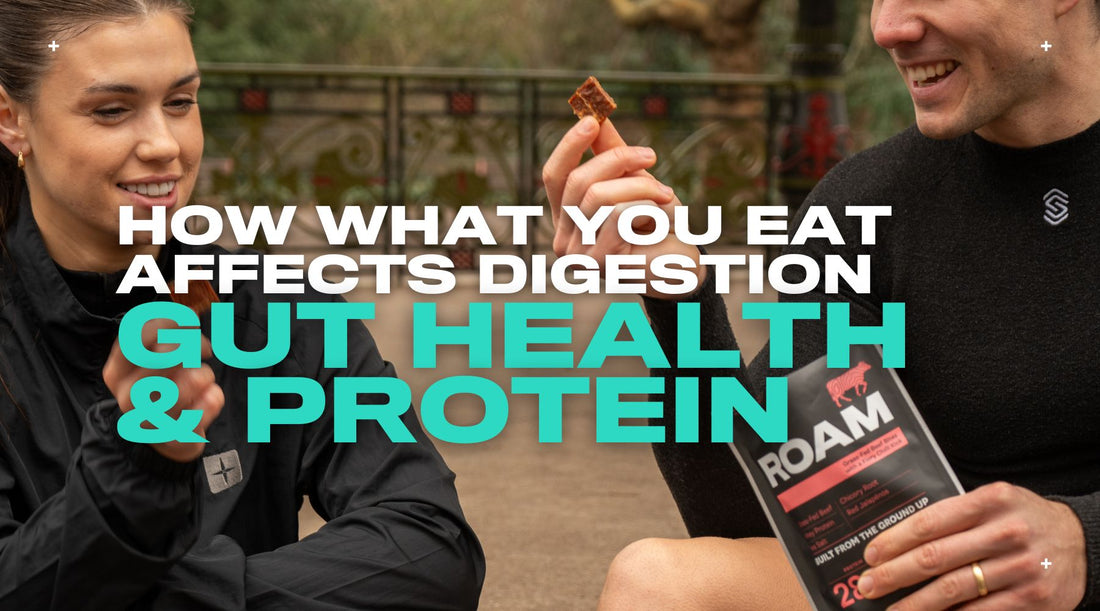
Gut Health & Protein: How What You Eat Affects Digestion and Wellness
Gut health isn’t just a trending topic, it’s the foundation of your overall well-being. From digestion to immune function to mood regulation, your gut plays a critical role in keeping you energised, clear-headed, and resilient.
And what you eat, particularly the type and quality of protein you consume, can either nourish your gut or disrupt it. This article breaks down the connection between protein and digestion, explains how artificial ingredients can wreak havoc on your gut, and explores how Roam bars support a healthy gut with their clean, simple formulation.
Why Gut Health Matters
Your gut is home to trillions of microbes that form your gut microbiome—a complex ecosystem that affects:
- Digestion and nutrient absorption
- Immune system performance
- Hormone production
- Mental health and mood via the gut-brain axis
A balanced gut microbiome helps regulate inflammation, maintain regular digestion, and keep energy levels steady. When it’s out of balance, you might experience bloating, fatigue, cravings, or more serious health issues over time.
How Protein Affects Gut Health
Protein is essential for building and repairing body tissues, but not all protein sources are created equal, especially when it comes to digestion.
Clean, Whole-Food Protein:
- Provides amino acids that support gut lining integrity
- Feeds the body without feeding harmful gut bacteria
- Easy to digest when minimally processed and low in additives
Poor-Quality Protein:
- Often paired with artificial sweeteners, sugar alcohols, gums, and preservatives
- Can cause bloating, gas, and gut irritation
- May negatively impact the balance of healthy gut bacteria over time
That’s why the source and simplicity of your protein is key, especially if you're eating protein bars and snacks regularly.

The Problem with Additives in Protein Products
Many mainstream protein snacks are marketed as healthy, but they often contain ingredients that can disrupt gut health when consumed regularly. Sugar alcohols like maltitol and erythritol, commonly used to sweeten low-sugar bars, are known to ferment in the large intestine, potentially leading to bloating, gas, and digestive discomfort, especially in those with sensitive guts.
According to a review in the International Journal of Dentistry, excessive intake of polyols can cause osmotic diarrhoea and gastrointestinal distress in certain individuals. Similarly, artificial sweeteners such as sucralose and aspartame may negatively alter the composition of gut bacteria. A study published in Cell Metabolism found that some artificial sweeteners could impair glucose tolerance by disturbing the microbiome.
Beyond sweeteners, many bars include gums and thickeners like xanthan gum and carrageenan to create texture and prolong shelf life. These additives have been linked to gut irritation and inflammation in sensitive individuals, as shown in Frontiers in Microbiology.
Additionally, highly processed protein isolates, often stripped of their natural enzymes and nutrients, may be harder for the body to digest and absorb effectively. When consumed frequently, this combination of low-quality protein and artificial additives can counteract the intended health benefits of high-protein snacking, potentially undermining both digestion and overall well-being.

Why Roam Supports a Healthy Gut
Roam bars & bites are designed with your entire system in mind, not just your macros.
Every bar or bites bag contains:
- Between 14g to 20g of protein from 100% grass-fed beef or pasture-raised turkey, or pork.
- Zero sugar, zero sweeteners, and zero additives
- No gums, emulsifiers, or stabilisers
- Our Grass-Fed Beef bars are a source of fibre
- A savoury profile that avoids artificial taste enhancers
Because they’re made with real food ingredients and minimal processing, Roam products are gentle on the digestive system and naturally support a balanced microbiome.
Other Foods That Support Gut Health
If you're looking to build a gut-friendly diet, prioritise:
- Fermented foods: such as kefir, kimchi, sauerkraut, and natural yoghurt
- High-fibre vegetables: like asparagus, leeks, garlic, and broccoli
- Whole-food protein sources: such as eggs, grass-fed meat, salmon, and legumes (if tolerated)
- Prebiotics and probiotics: either through diet or supplementation
And most importantly: read ingredient labels. Simpler is almost always better.
Final Thoughts
If you're working hard to fuel your body with protein, don’t let poor-quality ingredients undo your progress. Your gut is central to your overall health, and the foods you choose every day can either support or strain it.
Roam’s bars offer functional fuel, real protein from grass-fed beef, without any of the gut-damaging extras. They’re more than a snack, they’re a smart investment in your long-term wellness.
🔥 Roam. Real Fuel. Real Food.
Support your gut. Strengthen your body. Snack smarter.